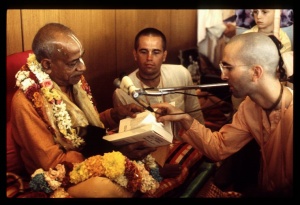CC Antya 7.28: Difference between revisions
m (1 revision(s)) |
No edit summary |
||
| Line 1: | Line 1: | ||
{{ | [[Category:Sri Caitanya-caritamrta - Antya-lila Chapter 07|C028]] | ||
<div style="float:left">'''[[Sri Caitanya-caritamrta|Śrī Caitanya-caritāmṛta]] - [[CC Antya|Antya-līlā]] - [[CC Antya 7|Chapter 7: The Meeting of Śrī Caitanya Mahāprabhu and Vallabha Bhaṭṭa]]'''</div> | |||
<div style="float:right">[[File:Go-previous.png|link=CC Antya 7.27|Antya-līlā 7.27]] '''[[CC Antya 7.27|Antya-līlā 7.27]] - [[CC Antya 7.29|Antya-līlā 7.29]]''' [[File:Go-next.png|link=CC Antya 7.29|Antya-līlā 7.29]]</div> | |||
{{CompareVersions|CC|Antya 7.28|CC 1975|CC 1996}} | |||
{{RandomImage}} | |||
==== TEXT 28 ==== | ==== TEXT 28 ==== | ||
<div | <div class="verse"> | ||
:'ātma-bhūta'-śabde kahe 'pāriṣada-gaṇa' | |||
aiśvarya-jñāne lakṣmī nā pāilā vrajendra-nandana | :aiśvarya-jñāne lakṣmī nā pāilā vrajendra-nandana | ||
</div> | </div> | ||
| Line 12: | Line 16: | ||
==== SYNONYMS ==== | ==== SYNONYMS ==== | ||
<div | <div class="synonyms"> | ||
ātma-bhūta- | ''ātma-bhūta-śabde''—the word ''ātma-bhūta''; ''kahe''—means; ''pāriṣada-gaṇa''—personal associates; ''aiśvarya-jñāne''—in the understanding of opulence; ''lakṣmī''—the goddess of fortune; ''nā pāilā''—could not get; ''vrajendra-nandana''—the shelter of Kṛṣṇa, the son of Nanda Mahārāja. | ||
</div> | </div> | ||
| Line 19: | Line 23: | ||
==== TRANSLATION ==== | ==== TRANSLATION ==== | ||
<div | <div class="translation"> | ||
"The word 'ātma-bhūta' means 'personal associates.' Through the understanding of the Lord's opulence, the goddess of fortune could not receive the shelter of Kṛṣṇa, the son of Nanda Mahārāja. | |||
</div> | </div> | ||
| Line 26: | Line 30: | ||
==== PURPORT ==== | ==== PURPORT ==== | ||
<div | <div class="purport"> | ||
Lakṣmī, the goddess of fortune, has complete knowledge of | Lakṣmī, the goddess of fortune, has complete knowledge of Kṛṣṇa's opulences, but she could not achieve the association of Kṛṣṇa by dint of such knowledge. The devotees in Vṛndāvana, however, actually enjoy the association of Kṛṣṇa. | ||
</div> | </div> | ||
__NOTOC__ | |||
<div style="float:right; clear:both;">[[File:Go-previous.png|link=CC Antya 7.27|Antya-līlā 7.27]] '''[[CC Antya 7.27|Antya-līlā 7.27]] - [[CC Antya 7.29|Antya-līlā 7.29]]''' [[File:Go-next.png|link=CC Antya 7.29|Antya-līlā 7.29]]</div> | |||
__NOTOC__ | |||
__NOEDITSECTION__ | |||
Revision as of 04:17, 20 September 2021

A.C. Bhaktivedanta Swami Prabhupada
TEXT 28
- 'ātma-bhūta'-śabde kahe 'pāriṣada-gaṇa'
- aiśvarya-jñāne lakṣmī nā pāilā vrajendra-nandana
SYNONYMS
ātma-bhūta-śabde—the word ātma-bhūta; kahe—means; pāriṣada-gaṇa—personal associates; aiśvarya-jñāne—in the understanding of opulence; lakṣmī—the goddess of fortune; nā pāilā—could not get; vrajendra-nandana—the shelter of Kṛṣṇa, the son of Nanda Mahārāja.
TRANSLATION
"The word 'ātma-bhūta' means 'personal associates.' Through the understanding of the Lord's opulence, the goddess of fortune could not receive the shelter of Kṛṣṇa, the son of Nanda Mahārāja.
PURPORT
Lakṣmī, the goddess of fortune, has complete knowledge of Kṛṣṇa's opulences, but she could not achieve the association of Kṛṣṇa by dint of such knowledge. The devotees in Vṛndāvana, however, actually enjoy the association of Kṛṣṇa.